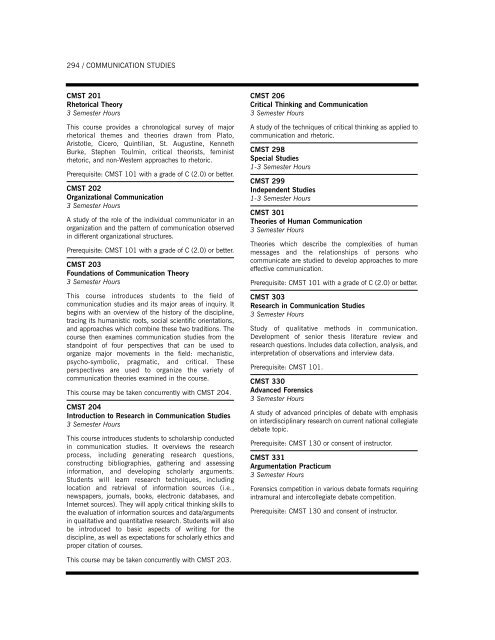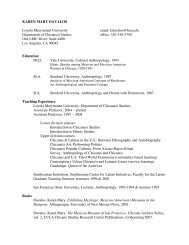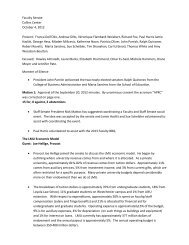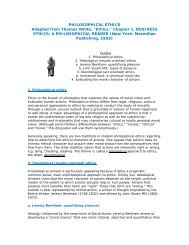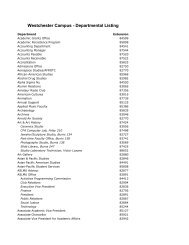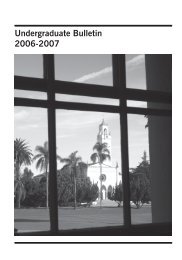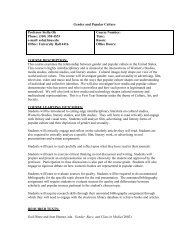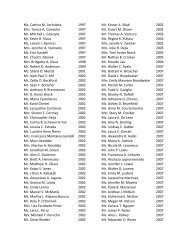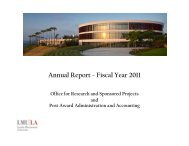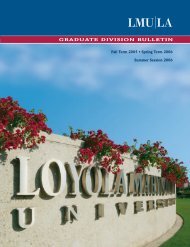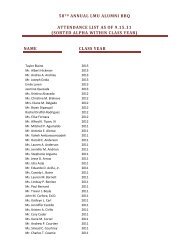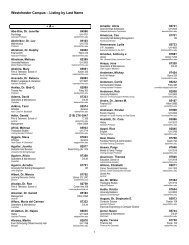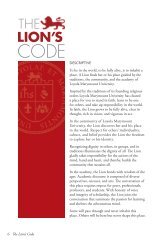- Page 1 and 2:
Undergraduate Bulletin 2004-2005
- Page 3 and 4:
University Phone Numbers Westcheste
- Page 5 and 6:
2005 SUMMER SEMESTER: Session One M
- Page 7 and 8:
The University History and Goals Th
- Page 9 and 10:
and a shared commitment to the Univ
- Page 11 and 12:
University Facilities
- Page 13 and 14:
West Hall Annex houses the Asian Bu
- Page 15 and 16:
University Services
- Page 17 and 18:
Marymount Institute for Faith, Cult
- Page 19 and 20:
Public Safety Director: Ray Hilyar
- Page 21 and 22:
Student Affairs The Division of Stu
- Page 23 and 24:
Asian Pacific Student Services Asia
- Page 25 and 26:
complement the academic mission of
- Page 27 and 28:
In the event that respect is lackin
- Page 29 and 30:
Admission Loyola Marymount Universi
- Page 31 and 32:
Admission of International Students
- Page 33 and 34:
Minimum AP Number of Equivalent Sco
- Page 35 and 36:
Appeals Procedure: The University h
- Page 37 and 38:
Grants University Grants Loyola Mar
- Page 39 and 40:
Ralph M. Parsons Memorial Scholarsh
- Page 41 and 42:
Edna Van Wart Castera Fund Financia
- Page 43 and 44:
Loyolan Out-of-State Catholic High
- Page 45 and 46:
Tuition and Fees The tuition charge
- Page 47 and 48:
Payment of Student Charges Tuition,
- Page 49 and 50:
University Core Curriculum
- Page 51 and 52:
Second Language) and ENGL 101 (Requ
- Page 53 and 54:
Note: International/Global Studies
- Page 55 and 56:
B.A. . . . . . . . . .Psychology B.
- Page 57 and 58:
Engineering and Production Manageme
- Page 59 and 60:
in writing by the chairperson of th
- Page 61 and 62:
II. Departmental Appeal A. The Stud
- Page 63 and 64:
course that is at a level more elem
- Page 65 and 66:
Change of Grades Grades, once submi
- Page 67 and 68:
LMU is authorized under the Act to
- Page 69 and 70:
ACADEMIC PROGRAMS AND SERVICES / 69
- Page 71 and 72:
Studies and other departments and d
- Page 73 and 74:
Affiliate Programs LMU is affiliate
- Page 75 and 76:
motion picture producer Arthur P. J
- Page 77 and 78:
The American Chemical Society Organ
- Page 79 and 80:
University Honors Program
- Page 81 and 82:
HNRS 115 On the Sublime 3 Semester
- Page 83 and 84:
Bellarmine College of Liberal Arts
- Page 85 and 86:
Communication or Critical Thinking
- Page 87 and 88:
A Multiple Subjects Subject Matter
- Page 89 and 90:
are to be chosen from the five focu
- Page 91 and 92:
AFAM 298 Special Studies 1-3 Semest
- Page 93 and 94:
American Cultures Studies Coordinat
- Page 95 and 96:
Asian and Pacific Studies Director:
- Page 97 and 98:
ASPA 201 Asian Civilizations 3 Seme
- Page 99 and 100:
Asian Pacific American Studies Dire
- Page 101 and 102:
Chicana/o Studies Faculty: Chairper
- Page 103 and 104:
CHST 298 Special Studies 1-3 Semest
- Page 105 and 106:
Classics and Archaeology Faculty: C
- Page 107 and 108:
Sophomore Year Fall Semester S.H. G
- Page 109 and 110:
Greek Model Four-Year Plan The norm
- Page 111 and 112:
Senior Year Fall Semester S.H. LATN
- Page 113 and 114:
Greek The GREK 101, 102, 201 sequen
- Page 115 and 116:
LATN 311 Horace and Catullus 3 Seme
- Page 117 and 118:
ARCH 411 Near Eastern Archaeology L
- Page 119 and 120:
The Basil P. Caloyeras Center also
- Page 121 and 122:
of the Chairperson. The B.S. degree
- Page 123 and 124:
ECON 110 Introductory Microeconomic
- Page 125 and 126:
ECON 371 Economic Development of Mi
- Page 127 and 128:
English Faculty: Chairperson: David
- Page 129 and 130:
courses specifically, since local,
- Page 131 and 132:
Spring Semester S.H. or ENGL 371 EN
- Page 133 and 134:
ENGL 311 Writing Workshop in Fictio
- Page 135 and 136:
ENGL 402 Writing Internship in Medi
- Page 137 and 138:
ENGL 542 British Fiction: 1950 to t
- Page 139 and 140:
ENGL 577 Major Figures in Rhetoric
- Page 141 and 142:
European Studies Director: Véroniq
- Page 143 and 144:
Junior Year Fall Semester S.H. EURO
- Page 145 and 146:
Geography Director: Peter Hoffman G
- Page 147 and 148:
History Model Four-Year Plan The no
- Page 149 and 150:
Area 1: Europe HIST 312 Society and
- Page 151 and 152:
HIST 351 American Reform Movements
- Page 153 and 154:
HIST 390 African Kingdoms 3 Semeste
- Page 155 and 156:
Humanities Director: Katerina Zacha
- Page 157 and 158:
Spring Semester S.H. or PHIL ___ TH
- Page 159 and 160:
IRST 300 Modern Irish Literature 3
- Page 161 and 162:
Liberal Arts The following courses,
- Page 163 and 164:
Liberal Studies Director: Sharon Lo
- Page 165 and 166:
Freshman Year Fall Semester S.H. AR
- Page 167 and 168:
Modern Languages and Literatures Fa
- Page 169 and 170:
Filipino The courses are designed t
- Page 171 and 172:
Upper Division Requirements: 25 sem
- Page 173 and 174:
FREN 204 Intermediate French II 3 S
- Page 175 and 176:
German Objectives: During the phase
- Page 177 and 178:
GRMN 432 German Folklore 3 Semester
- Page 179 and 180:
ITAL 350 Contemporary Italian Cultu
- Page 181 and 182:
Spanish Spanish Major: Objectives:
- Page 183 and 184:
Spring Semester S.H. SPAN 204 Inter
- Page 185 and 186:
Students may take no more than ten
- Page 187 and 188:
SPAN 420 Hispanic Cultural Studies
- Page 189 and 190:
Peace Studies Director: Daniel L. S
- Page 191 and 192:
Honors in Philosophy To graduate wi
- Page 193 and 194:
PHIL 321 Bioethics 3 Semester Hours
- Page 195 and 196:
PHIL 363 Personalism 3 Semester Hou
- Page 197 and 198:
PHIL 464 Philosophy of Mind 3 Semes
- Page 199 and 200:
Upper Division Requirements: 27 sem
- Page 201 and 202:
POLS 198 Special Studies 1-3 Semest
- Page 203 and 204:
POLS 338 Civil Rights Movements 3 S
- Page 205 and 206:
POLS 361 International Cooperation
- Page 207 and 208:
• Design research to test a hypot
- Page 209 and 210:
Spring Semester S.H. or AMCS 100 AM
- Page 211 and 212:
Students may take no more than ten
- Page 213 and 214:
PSYC 321 Psychology of Marriage 3 S
- Page 215 and 216:
PSYC 435 Psychology of Death and Dy
- Page 217 and 218:
PSYC 510 Capstone Course: The Histo
- Page 219 and 220:
Sociology Model Four-Year Plan The
- Page 221 and 222:
I. Deviance and Social Control SOCL
- Page 223 and 224:
SOCL 356 Sociology of Law 3 Semeste
- Page 225 and 226:
Theological Studies Faculty: Chairp
- Page 227 and 228:
Spring Semester S.H. THST 110 Intro
- Page 229 and 230:
Biblical Theology THST 301 Ancient
- Page 231 and 232:
THST 430 Christology 3 Semester Hou
- Page 233 and 234:
Urban Studies Director: Peter R. Ho
- Page 235 and 236:
Spring Semester S.H. URBN 135 Urban
- Page 237 and 238:
Women’s Studies Faculty: Chairper
- Page 239 and 240:
Spring Semester S.H. WNST 301 Femin
- Page 241 and 242:
WNST 351 Genders and Sexualities 3
- Page 243 and 244: College of Business Administration
- Page 245 and 246: University Core Curriculum for the
- Page 247 and 248: Total Program The B.B.A. degree pro
- Page 249 and 250: TOUR 481 Strategic Management Semin
- Page 251 and 252: Hispanic Business Studies Minor In
- Page 253 and 254: ACCT 314 Accounting Information Sys
- Page 255 and 256: FNCE 429 Capital Markets 3 Semester
- Page 257 and 258: ISQM 476 PC-Based Decision Support
- Page 259 and 260: MGMT 435 Employee and Labor Relatio
- Page 261 and 262: International Business Studies INBA
- Page 263 and 264: BLAW 408 Real Estate Law 3 Semester
- Page 265 and 266: MRKT 465 Marketing Promotional Stra
- Page 267 and 268: Travel and Tourism Faculty: Directo
- Page 269 and 270: TOUR 496 Travel and Tourism Informa
- Page 271 and 272: Administration: Dean: Barbara J. Bu
- Page 273 and 274: dealing with international and glob
- Page 275 and 276: Sophomore Year ART AND ART HISTORY
- Page 277 and 278: ARHS 360 History of Design 3 Semest
- Page 279 and 280: Freshman Year Fall Semester S.H. AR
- Page 281 and 282: Junior Year Fall Semester S.H. or A
- Page 283 and 284: Upper Division Requirements: 30 sem
- Page 285 and 286: ART 201 Figure Drawing Workshop II
- Page 287 and 288: ART 364 Digital Illustration 3 Seme
- Page 289 and 290: ART 401 Figure Drawing Workshop II
- Page 291 and 292: Communication Studies Faculty: Chai
- Page 293: Spring Semester S.H. [Select 2 of t
- Page 297 and 298: Dance—Department of Theatre Arts
- Page 299 and 300: Senior Year Fall Semester S.H. DANC
- Page 301 and 302: DANC 142 Jazz Dance I 0-2 Semester
- Page 303 and 304: DANC 360 Advanced Choreography 3 Se
- Page 305 and 306: DANC 460 Dance Theory and Criticism
- Page 307 and 308: Music Faculty: Chairperson: Mary Br
- Page 309 and 310: Music Minor Curriculum 21 Semester
- Page 311 and 312: Spring Semester S.H. MUSC 318 Music
- Page 313 and 314: MUSC 180 Guitar, Percussion, Piano,
- Page 315 and 316: MUSC 328 Choral Methods I 2 Semeste
- Page 317 and 318: MUSC 413 Music of the Baroque 3 Sem
- Page 319 and 320: MUSC 492 Chamber Music Ensembles 0-
- Page 321 and 322: Junior Year Fall Semester S.H. THEA
- Page 323 and 324: THEA 252 Workshop: Playwrights and
- Page 325 and 326: THEA 425 Scene Painting 3 Semester
- Page 327 and 328: Frank R. Seaver College of Science
- Page 329 and 330: Social Sciences 6 Semester Hours St
- Page 331 and 332: Foreign Language Students are encou
- Page 333 and 334: Biology Faculty: Chairperson: M. Ca
- Page 335 and 336: Junior Year Fall Semester S.H. BIOL
- Page 337 and 338: BIOL 194 Introduction to Research 1
- Page 339 and 340: BIOL 312 Field Botany 4 Semester Ho
- Page 341 and 342: BIOL 371 Plant Biochemistry 3 Semes
- Page 343 and 344: BIOL 499 Independent Studies 1-4 Se
- Page 345 and 346:
Chemistry and Biochemistry Faculty:
- Page 347 and 348:
Spring Semester S.H. CHEM 430 Adv I
- Page 349 and 350:
Senior Year Fall Semester S.H. BIOL
- Page 351 and 352:
CHEM 267 Modern Scientific Discover
- Page 353 and 354:
CHEM 461 Instrumental Analysis Lab
- Page 355 and 356:
Civil Engineering and Environmental
- Page 357 and 358:
Spring Semester S.H. CIVL 406 Water
- Page 359 and 360:
CIVL 305 Structural Theory 4 Semest
- Page 361 and 362:
CIVL 514 Groundwater Hydrology 2 Se
- Page 363 and 364:
ENVS 544 Applied Microbiology 2 Sem
- Page 365 and 366:
Computer Science Description: The c
- Page 367 and 368:
Freshman Year Fall Semester S.H. CH
- Page 369 and 370:
Senior Year Fall Semester S.H. CMSI
- Page 371 and 372:
ELEC 383 Introduction to Microproce
- Page 373 and 374:
ELEC 563 ASIC Design 3 Semester Hou
- Page 375 and 376:
CMSI 365 Enterprise Production Prac
- Page 377 and 378:
CMSI 585 Programming Languages 3 Se
- Page 379 and 380:
ENGR 140 Engineering Graphics and D
- Page 381 and 382:
Lower Division Major Requirements:
- Page 383 and 384:
Spring Semester S.H. ____ ___ Elect
- Page 385 and 386:
Spring Semester S.H. MATH 245 Diffe
- Page 387 and 388:
MATH 234 Calculus III 4 Semester Ho
- Page 389 and 390:
MATH 360 Introduction to Probabilit
- Page 391 and 392:
Mechanical Engineering Faculty: Cha
- Page 393 and 394:
Senior Year Fall Semester S.H. MECH
- Page 395 and 396:
MECH 441 Mechanical Engineering Lab
- Page 397 and 398:
Natural Science Bachelor of Science
- Page 399 and 400:
Spring Semester S.H. ____ ___ Indep
- Page 401 and 402:
B.S. Degree in Natural Science Envi
- Page 403 and 404:
Spring Semester S.H. BIOL ___ UD Ph
- Page 405 and 406:
Objectives: The athletic training s
- Page 407 and 408:
NTLS 154 Human Anatomy and Physiolo
- Page 409 and 410:
NTLS 276 Atmospheric Science 3 Seme
- Page 411 and 412:
NTLS 397 Athletic Training Internsh
- Page 413 and 414:
NTLS 531 Principles of Water Qualit
- Page 415 and 416:
Physics Curriculum (125 S.H.) Fresh
- Page 417 and 418:
Spring Semester S.H. PHYS 322 Quant
- Page 419 and 420:
PHYS 272 Physics 3 Semester Hours A
- Page 421 and 422:
School of Education
- Page 423 and 424:
• Collaborate and share leadershi
- Page 425 and 426:
administered by the School of Educa
- Page 427 and 428:
e submitted to the School of Educat
- Page 429 and 430:
XI. APPLICATION FOR A CREDENTIAL: W
- Page 431 and 432:
prerequisites without formal admiss
- Page 433 and 434:
Course Requirements for the Educati
- Page 435 and 436:
EDUC 401 Educational Psychology for
- Page 437 and 438:
EDUC 425 ELD Methods/SDAIE 3 Semest
- Page 439 and 440:
EDUC 475 Teaching and Assessing Stu
- Page 441 and 442:
School of Film and Television
- Page 443 and 444:
Core Curriculum for the Baccalaurea
- Page 445 and 446:
Recommendations: Students are encou
- Page 447 and 448:
Junior Year Fall Semester S.H. ANIM
- Page 449 and 450:
ANIM 340 Interactive Animation 3 Se
- Page 451 and 452:
Senior Year Fall Semester S.H. or F
- Page 453 and 454:
FILM 412 Film Authors 3 Semester Ho
- Page 455 and 456:
Recording Arts Lower Division Requi
- Page 457 and 458:
RECA 367 Production Sound 3 Semeste
- Page 459 and 460:
Junior Year Fall Semester S.H. FILM
- Page 461 and 462:
Television Production Lower Divisio
- Page 463 and 464:
TVPD 398 Special Studies 1-3 Semest
- Page 465 and 466:
Aerospace Studies All University Co
- Page 467 and 468:
AERO 301 Air Force Leadership Studi
- Page 469 and 470:
CAMPUS MAPS / 469
- Page 471 and 472:
Trustees of the University R. Chad
- Page 473 and 474:
University Administration President
- Page 475 and 476:
Administration Lynne B. Scarboro Vi
- Page 477 and 478:
University Faculty JENNIFER S. ABE-
- Page 479 and 480:
JANE BRUCKER (1993) Associate Profe
- Page 481 and 482:
DONALD DePAMPHILIS (2000) Visiting
- Page 483 and 484:
WILLIAM J. FULCO, S.J. (1998) Profe
- Page 485 and 486:
MICHAEL P. HORAN (1994) Associate P
- Page 487 and 488:
PETRA LIEDKE KONOW (1995) Associate
- Page 489 and 490:
ELIZABETH MURRAY (1987) Professor o
- Page 491 and 492:
NINA M. REICH (2003) Assistant Prof
- Page 493 and 494:
JEFFREY S. SIKER (1987) Professor o
- Page 495 and 496:
ROBIN WANG (1999) Assistant Profess
- Page 497 and 498:
ELISA SLATER (1999) Reference Libra
- Page 499 and 500:
Index A Academic Advising . . . . .
- Page 501 and 502:
L L.A. Miscellany . . . . . . . . .


